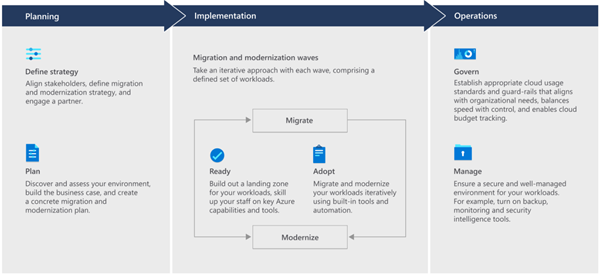Moving to the cloud can be complex. Here’s a simple breakdown you need to know to get started.
Many businesses rely on some form of legacy on-premises infrastructure that they own, host, or manage.
With the IT industry changing rapidly, businesses require solutions that are up to date, flexible and efficient to maintain sustainable long-term growth. Moving workloads, applications and processes to the cloud can allow businesses to take advantage of the many benefits of cloud technology. Accelerating innovation helps businesses stand out from competitors.
In this blog, we will discuss the ins and outs of cloud migration, and what businesses can expect when migrating to the Azure cloud.
What is Cloud Migration?
A cloud migration is the method of moving legacy assets, such as applications, data, servers, or processes, to a public or private cloud. This blog will focus particularly on Microsoft’s Azure cloud platform. However, important to note that other providers include AWS and Google Cloud as leading competitors. It also includes the ongoing process of maintaining and optimising the cloud once the migration is complete.
Benefits of Moving to the Cloud
Cost Efficiency and Scalability
Traditionally, with legacy on-premises infrastructure, businesses have significant upfront costs associated with the technology; the installation, maintenance costs, electricity, and sufficient cooling. Upgrading the technology has long time periods of completion (in some cases taking months to fully optimise). As businesses decide to expand or downsize, there is not an easy way to change infrastructure requirements so increasing or decreasing resources can be a costly investment.
In comparison, cloud technology allows businesses to only pay for the resources they use, nothing more. One of the key USP’s for cloud tech is that there are no extra costs involved with requirement changes.
Performance and Reliability
The Azure cloud has a 99.9% uptime and is one of the most powerful clouds available. Keeping network latency low and provides an end-user experience that is significantly faster and more powerful than high-end on-premises infrastructure.
The Microsoft Azure cloud platform is designed to work with the user and not against. Trust in the performance of Microsoft Azure cloud platforms enables organisations to design and operate mission-critical applications with confidence. Building trust and prioritizing transparency, whilst keeping the user informed to be able to act quickly during service issues.
Security
Security is at the heart of cloud technology. Microsoft has spent $1B+ USD investing in security R&D and 3,500 cyber security experts working 24/7, along with advanced AI, working to keep all processes, applications, and data in the cloud safe. Microsoft analyses 8 trillion threat signals every single day, ensuring businesses can feel safe knowing that their data and applications will not fall into the hands of a cybercriminal. Similarly, there are many security features built into the Azure cloud to help IT professionals run cloud processes safely and effectively.
Cloud Migration Process
The process of migrating to the cloud requires expertise and a thorough understanding of a business and its goals. It includes the initial planning and assessment of legacy systems, including applications, databases, and servers.
There are many things that need to be considered when making the move. From building cloud skills, setting up landing zones for workloads to modernizing apps and data. More information about the planning, implementation and operations can be found visiting the Microsoft website here.
A migration strategy is designed with contingency plans and roll-back plans to answer worst case scenarios.
(source, Microsoft)
A pilot migration will be completed to resolve any issues and ensure that all requirements are met.
Finally, the migration will be run, typically over a weekend, or throughout the night, to limit the amount of disruption for the business and its employees. This process of migration is typically undertaken by a third-party IT provider, as businesses can rely on their previous experience and expertise.
Key Challenges
Lack of Strategy and Planning
If businesses rush this process of migration, they will likely have a poor final outcome, which can negate the benefits of moving the cloud and hurt the growth of a business. Due to businesses needing different requirements and goals, it can be said that there isn’t a ‘one hat fits all’ strategy. Having a cloud partner is strongly advised in order to articulate and design the perfect migration strategy that provides success and longevity to the cloud systems.
Poor Cost Optimisation
Although one of the key benefits of moving to the cloud are cost savings, as costs are based off resource consumption, if a business does not optimise their usage and costs, they may be surprised by a high bill. Microsoft Azure has free built-in functionality to predict usage and the associated costs, and the tools available to optimise usage to decrease overall costs whilst increasing efficiency.
There is additional information and resources provided by Microsoft that help with the analysis of overall costs associated with moving to the cloud. Areas such as CPU and memory utilisation, network latency, load balancing, etc. As explained by our Data Analytics Consultant, Lyubomir Lirkov at Adatis, a good way to do it is by using а pricing calculator. You can select multiple products, set different parameters and get a cost estimate. You will find out that in most cases cloud offerings are way cheaper when compared to your local infrastructure. The main reason is that you pay only for the resources that you use. Read more here.
Ready to Move to the Cloud?
Moving to the cloud can help businesses grow, whilst increasing profitability, productivity and accelerating digital transformation. However, in order to realise these benefits, the migration process must be carefully designed and monitored by a team of professionals.
If you would like to learn more about cloud migration and how Adatis can support your organisation, we would love to chat. Get in touch today or email enquiries@adatis.co.uk.



Introduction to Data Wrangler in Microsoft Fabric
What is Data Wrangler? A key selling point of Microsoft Fabric is the Data Science
Jul
Autogen Power BI Model in Tabular Editor
In the realm of business intelligence, Power BI has emerged as a powerful tool for
Jul
Microsoft Healthcare Accelerator for Fabric
Microsoft released the Healthcare Data Solutions in Microsoft Fabric in Q1 2024. It was introduced
Jul
Unlock the Power of Colour: Make Your Power BI Reports Pop
Colour is a powerful visual tool that can enhance the appeal and readability of your
Jul
Python vs. PySpark: Navigating Data Analytics in Databricks – Part 2
Part 2: Exploring Advanced Functionalities in Databricks Welcome back to our Databricks journey! In this
May
GPT-4 with Vision vs Custom Vision in Anomaly Detection
Businesses today are generating data at an unprecedented rate. Automated processing of data is essential
May
Exploring DALL·E Capabilities
What is DALL·E? DALL·E is text-to-image generation system developed by OpenAI using deep learning methodologies.
May
Using Copilot Studio to Develop a HR Policy Bot
The next addition to Microsoft’s generative AI and large language model tools is Microsoft Copilot
Apr